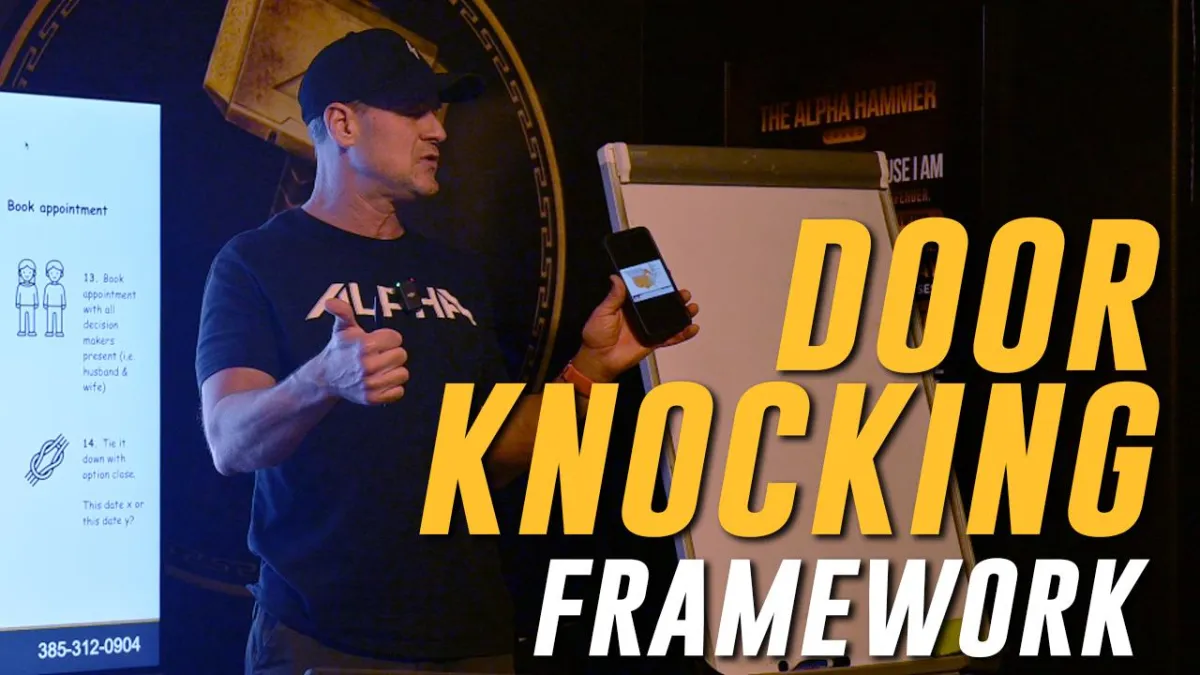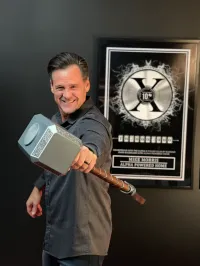BLOG POSTS
Solar Lords Closing School Secrets
BLOG POSTS
Secrets of Success

Door Knocking Framework
“If you don't have a pullback in what you're doing, you're gonna probably fail....It's that critical.” - Mike Morris
This cost me a lot of money to figure this out. Until I actually had this framework, I would go knock on doors and I couldn't figure out why nobody would open the door. So number one, I couldn't get them to open the door. So that cost me money because I knock on doors and nobody answers. I went down to Vineyard. I think there's probably 500, 750 homes down there. I think I got maybe three sales out of the entire city of Vineyard. It was bad. I was probably close to buckling and it wasn't until I started learning a little bit that I discovered, “Okay, there's a way way to approach a door and to knock it.” Once I figured this out, all of a sudden I started making money.

Door Approach/Curiosity
I put in here some tools you can use, some tools that I use, and then you guys can just try and toy with it and make your best out of it. I'll show you the science behind doing this. I broke it up into six sections. So, door approach. When I go knock on doors, typically my buyer is a man. Men seem to be the ones that buy solar. Now I don't want to dissuade you from knocking on doors and talking to women. I know that men typically are the ones that buy solar but I've seen you guys as reps knock on doors with plenty of women, get appointments, and get deals. And so I don't want to dissuade you from it but I can tell you collectively, on average, most of the time it's men that buy solar.
When I'm walking down the street, I'm trying to find a door. If I see a husband out of the house, I'm like, “dude, there's a guy, that's a person right there. I don't even have to knock on the door. I can just walk up to him and start talking to him.” But I try to identify them. And then one of the things that I do is, is I take and I look up…you guys have seen the apps I've put in the training section. I think it's parceled and then there's a Utah County app where it shows you the name of the homeowner. I use that because, it seems to me, if I can approach somebody like a friend, I seem to do a better job. The first thing I know is they're going to try to screen me out and I don't like getting screened out. So if I come across as a friend or somebody that they think they know, they're going to be very uncomfortable pretending like, "Dude, I don't know who you are. Why are you on my doorstep?" You know what I mean?
I don't want to be screened out so I look up the homeowner's names and then when I walk up to the house, I always look for things that I can compliment. Like I'm like, "Oh, that's a cool truck." "Dude, those are cool rims." "That's a cool tree." Something that you can tell that the homeowner's proud of. Now, you don't have to use this. I'm just showing you what I've used that's been effective.
So I try to notice things about their house that I can compliment. And then when I knock on the door, I step back from the door and I look in the opposite direction. Why do I look in the opposite direction? Makes me curious, right? What happens when I knock on the door and there's a peephole right there and I'm like, looking out like this? They want to know who's there. They’re gonna be like, “I don't know who this is and I can't see their face so I'm gonna open the door and see.”
Get Past Gatekeeper/Screener
That's why you look in the opposite direction. If they look through the peephole and see you, they're like, “I don't know who he is” and don't answer. You get screened out.
On door cams, those doorbell cams, I never hit them. I always knock. I think what happens on the door cam is you hit the door cam, then it probably sends a thing to their phone, then they can look at your face. If I see a door cam, I go like this, boop, and I go walk back like this. I just don't want them to see my face. As far as they know, I could be a missionary, I could be a bishop, I could be their next door neighbor. They don't know who I am and it makes them curious. Curiosity is the king of getting people to try something, then I can flush them out.
Then, this is where I'm gonna get screened out. Now, you guys can try it however you want, but typically, I ask for the husband by first name. That way the wife's not like, if I go, “Hey, is Mr. Morris here?” then she’s gonna go, “Oh, you're a sales guy,” and say,
“Nah, he's taking a shower”. Like, sure he is. “Yeah, he's not here, he's at the store.” Sure he is. Because I don't like those excuses, I borrowed this from Tony Robbins. I just greet him like a friend. I'm like, “Hey, is Mike here?” And when they're like, "Oh, okay. So -and -so knows them, therefore they're a friend,” then I usually get passed the gatekeeper.
Rapport Questions & Solar Hooks
When they come to the door I usually greet them by name. Obviously, they're not gonna know who I am, but I'm trying to figure out how to get them engaged and not immediately screen me out. If they come to the door and I'm like, “I'm the solar guy,” they're like, “Dude, you guys keep knocking on my door and I don't like that.” So I call them by name so that they're less likely to do that. Then, I just go into a type of rapport building.
Okay, so now that you're talking to the customer, what do you say? Right here, I think there's some poetic license. It's helpful to understand that people buy from friends.
When you came and knocked doors with me and Brytt, we spent time turning those suckers into friends or those prospects into friends because they're gonna have a hard time saying no if they like us. I mean, I just know it's how it works. Some tools that help you are the scripts inside the training. So you can use those scripts. Jaden’s is in there, Isaac's is in there. We need to get Tyson's in there.
It'll be helpful as you go out and you start mentoring and coaching. You're like, "Well, my script's in there. You can try that. Try any of these other ones." But you can use the script and then I put in here something that I like to do a lot. When I get into a conversation, I take time and ask people things that I know will cause the other person to engage. For example, if I ask, “Where are you from?” Everybody's got a backstory. Everybody can tell you where they came from. They're gonna tell you exactly what they want you to know about them. Then I say, “Hey, what brought you here? You know what brought you to Elkridge [or whatever]? How do you like it? What kind of work do you do?" People like talking about their work.
Some tools that I use to get into rapport are mirror and matching. I like to tell people that I'm the local solar guy. It's a little disarming. I think a lot of times people would rather work with locals than big box chain brands. One of the things that I like to do is, on my phone, one of the things I've been, like with Brytt, we're going into these neighborhoods where nobody's got solar. The last guy that bought from us was probably 76. What he really bought from us was security. Like, if we didn't have batteries, I'm not totally convinced that he would have bought. I think batteries is what allowed him to buy. We sold him security. But what was helpful was understanding your market. So when they start talking about, you know, they think they're not interested in solar. And I'm like, “Oh, did you know our rates went up 96 %?” Then I tell them a story, I tell them how we're shutting down coal -fired plants and I show them this graph right here and I'm like, “Two-thirds of the United States doesn't have power now.” And then they start kind of looping through it.
I have other slides on here where Brytt and I knocked on one door Saturday. After we closed our deal, we went and knocked on one door 'cause we had time left. The guy already had people who wanted to talk to him about solar. They weren't interested. So we, I literally looped into why the rates went up, what's going on in the marketplace. They said they just lost their nuclear power plant, flushed a decade out the door. Then I showed them the profit and loss for the utility company. I'm like, "See how they're losing money right here?" And then after he kind of got that, I'm like, "Rate increases are not done." He didn't think it would save him much. So then I actually pulled up another slide and I said, "Well, like,” I showed him, “here's somebody's bill now." And I times that by your current average bill, times 12 months, times 30 years. I said, "So if they never raise prices again, this is what it's going to come out to. So solar is like 20 grand. If they never raise the bill again, it's 60 grand.” He's like, “What?” I'm like, “So you can see it's a third the price.” I showed him the calculations on rate increases. “It's like 10 cents on the dollar, maybe even five cents on the dollar, depending on how it plays out.” And the guy's like, “huh?” I'm like, “yeah, we're not talking cents. We're talking hundreds of thousands.” And the guy's like, “What? Okay, I'll meet with you guys.” There you go. You find a way to hook him.
Objections
In the beginning, what you're probably doing is just trying to turn over the turds, see if there's a diamond. But as you become better at it, you can get more people interested that previously weren't. So, objections. Just initially, what I do is I just agree with people. I agree with them. I don't fight people. You tell me, you tell me I'm ugly? I'm like, "Yeah, you're right. You know what I did to make that better? I started wearing a hat.” I don't fight with them. I just agree with them and then I use this “things changed” and show them what changed. Then, I move into asking “Does that make sense? You see what I mean?”
I like to show this [image], like, you see what I mean? I don't know what to do to fix it. They need power. We just lost the power of 90 ,000 homes and it just went up in smoke. Now what? But then I say, “Does that make sense?” What it is, it's a trial close. Think of a turkey on Thanksgiving, right? Who wants to eat a raw turkey? Nobody here wants raw turkey, right? Anybody want salmonella? Nobody wants salmonella. See, you jab a thermometer into it,you open up the thing, and you look at it and it's like, “Oh, not done yet.” “Oh, not done yet.” You open it up. “Ah, it's done.”
A trial close is how you ask a question. It's kind of fun when I'm in here with Tyson and I see this look on his face. I'm like, “Here we go. He’s hung up on something.” Tyson's like, “Well how do you know that?” I'm like, “You got the look in your face, bro.” I know that I need to pause because I'm going this way and you're back here. What I do is I go through something I'm like, “Hey, Jay, does that make sense? You see what I mean? Are you following this?” Seeing you say that, I can see that you're not confused. Then I'm like, “Okay, cool. I can move on.” It helps me identify where somebody's lost or that they're understanding and we can move on.
Pullback
It also gets them to say yes. Yes, yes, yes, yes, yes, yes, yes, yes. I need 10 ,000 yeses. Then when I say, “Hey, you wanna buy?” They're like, “Hey, man, I've already been saying yes for the last hour. Sure, let's do it.” Then I do the pullback. If you don't have a pullback in what you're doing, you're gonna probably fail. The pullback is, I need to make a slide about commission breath. I call it "commission breath" because somebody's like, “Buy my solar, buy my solar, buy my solar,” and they're like, "You stink, you stink, you stink, stop talking about this.” People have a habit of only talking about what they want and so what you do is say, “You know, I'll run the numbers to see if it benefits you and then you can decide if it's worth it. Would that be fair?” That way it doesn't look like I'm trying to shove junk on that they don't want and I pull back when I say, “Would that be fair? I'll just run numbers and then you decide if you want it. I'll even just run numbers.” I even straight up tell people, "I don't care if you get it. If you get it, cool, if you don't, you know, it doesn't work for everybody. If it works for you, cool. If it doesn't, it doesn't. I can only show you the numbers and you can decide.”
I say that all the time. I say, "Would that be fair?" And then they're like, "Yeah, that would be fair.” “Okay, cool." You don't have a pullback, you're probably not going to get an appointment. It's that critical.
Book Appointment
On appointments, this right here will probably help you right here. When I set an appointment after they do this and they get interested. I'm probably pretty strong on how I set appointments. I don't really pussyfoot around it. I'm like, “Cool. Let's see. Today's Monday. Would Wednesday or Thursday be better for you and your wife?”
If it's not good, they're like, “No, neither one of those days are good.” “Okay, cool. How about Saturday? Does Saturday work? So Saturday at 10, 10 or one?” I try to give them options, but I don't give them an option not to do it. I give them them option A, option B, option A, option B. After they say, “Okay, Saturday at 10 would work.” It's like, “Cool. So will you and your wife both be here?” I confirm. I'm gentle, but I'm very clear in this phase of my appointment. “Okay, Saturday at 10, cool.” I'll put it down like this, and then I put it on my calendar because half the battle is getting a belly button at the appointment so you can close a deal. And because I know that that's a big deal, sometimes I'll even j put it on them sometimes. Like, “What is the best day of the week? The most convenient time for you, when you guys are around?” Because some people are hard to get, right? And they're going to forget. So if you and all I'm saying is “If you accidentally forget, but you're here anyways, when is that?” I'm gonna show up like I already know people are gonna forget. I try to be very specific about times that are convenient for them so that I have a chance at it. After they do that, boom, tie it down, put it in my appointment book, and close it.
Learn more about getting the Solar Lords Closing School news letter. In this news letter I share the frameworks that I have discovered over the last 8 years.
If you think about it, one simple framework would save you hundreds of hours and make you several thousands to hundreds of thousands by simple using tested tools.
Learn More > Solar Lords Closing School
Case Studies
Isaac Reid
"I went from selling pest control out of state making $5K/mo to staying home and making $23K a month. It's crazy I left my state when all I needed was a new opportunity."
These results are not typical
Isaac Case Study >
Thursday, October 12, 2023 50 Best Napoleon Hill Quotes Of All Time
inspired by: Napoleon Hill
Tuesday, October 10, 2023 🌱 How To Turn Adversity Into Opportunity
inspired by: Napoleon Hill
Thursday, October 05, 2023 The Easiest Ways To Cultivate GRIT
Thursday, October 12, 2023 How To Create Your Own Mastermind Group 🧠
inspired by: Napoleon Hill
Thursday, September 28 2023 Can You Really THINK And Grow Rich?
inspired by: Napoleon Hill
Tuesday, September 26, 2023 🚫 5 Things NOT To Do For Ultimate Success 🚫
inspired by: Napoleon Hill
Thursday, September 21, 2023 What Do You Dream Of?
inspired by: Napoleon Hill
Tuesday, September 19, 2023 What The Heck Is “Autosuggestion”?
inspired by: Napoleon Hill
Thursday, September 14, 2023 12 Quick Lessons On THINKING & Growing Rich
inspired by: Napoleon Hill

Secrets of Success © 2024 | All Rights Reserved | SecretsOfSuccess.com
Terms | Income Disclaimer

